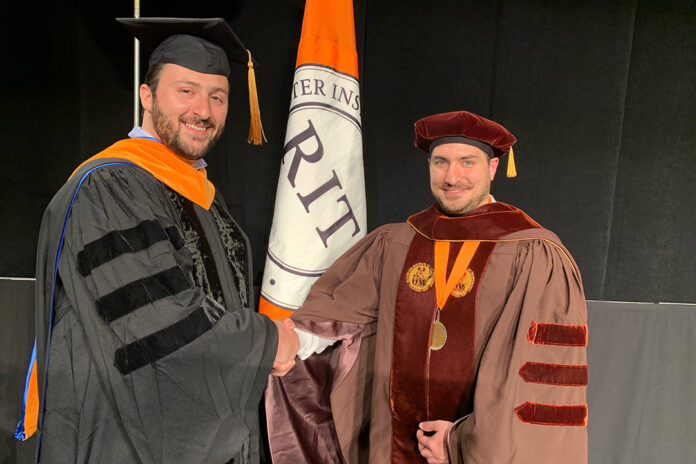Dimitris Chachlakis became the first student to be awarded the new Ph.D. in electrical and computer engineering this May from Rochester Institute of Technology.
The new degree, recently approved by the New York State Department of Education, builds upon the Ph.D. in engineering, a multi-disciplinary degree established several years ago, and since then refined into three distinct programs. Chachlakis transitioned into the new degree program and focused studies on the trending area of multi-modal tensor data analytics and machine learning.
“The Ph.D. in engineering was recommended to me by my adviser,” said Chachlakis, who came to RIT from the Technical University of Crete, Greece. “Getting into the program, I was exposed to diverse disciplines and learned how to collaborate. History has shown that when people come together from the different disciplines, you can see that they all can accomplish so much more.”
That collaboration included responsibilities as a research assistant in the MILOS Lab in the Kate Gleason College of Engineering, and as co-author of multiple papers for peer-reviewed journals in the area of signal processing and machine learning. In his doctoral dissertation he proposed new theory for the joint analysis of data from multiple sources, based on L1 Norm formulations.
“We are trying to develop new fundamental theory, applicable in anything in science and engineering that rely on data processing,” said Chachlakis. “The L1 norm is basically a new formulation for taking the multi-dimensional array, also known as a tensor, and analyzing it into main components while suppressing data corruption and noise. And tensors are ideal data structures for capturing inter-dependencies across the dimensions.”
Tensors can be used for data assessment and analysis, specifically to refine how big data sets from multiple sources can be best assessed and ensure that the information is reliable. That reliability is essential for applications using computer vision, or improving MRI technology in health care, for example.
The three new doctoral programs are an evolution and replacement of the Ph.D. in engineering, a degree program established by RIT’s engineering college in 2014. The foundations of the program were its multidisciplinary look at problem solving and its emphasis in meeting demands based on national initiatives from the U.S. Departments of Labor, Energy, Transportation and Health and Human Services. The program had eight students enrolled in its first year and had expanded to 90 by 2020.
The foundations of that Ph.D. in engineering have not changed, and have been thoroughly integrated into four separate areas with associated disciplines: electrical and computer engineering, mechanical and industrial engineering, and biomedical and chemical engineering—and the focus remains on using a multidisciplinary approach to solving today’s global problems.
Students in the original doctoral program were offered the option to complete coursework in the program or transition to one of the new doctoral programs. Chachlakis decided on the latter, and in spring, defended his dissertation, titled “Theory and Algorithms for Reliable Multimodal Data Analysis, Machine Learning and Signal Processing.”
Chachlakis started at his new job at Digimarc virtually just a few days after graduation. He intends to move to the company headquarters in Oregon toward the end of summer. The company is best known for its digital watermarking technology, and Chachlakis will be part of its engineering R&D team.
“This will be my first job after earning the Ph.D. and I’m expecting that this is going to be satisfying, and also the team that I am going to join, I feel like they have a noble cause—that makes me feel even better about it,” he said. “I feel like I am contributing to society by working and improving the technology they already have. When I was doing my undergraduate work, I really didn’t have a plan of what I was going to do next. In retrospect, I would do the Ph.D. again a thousand times over. It was challenging, not only because of the workload and the commitment, but moving to a new country by myself. Thankfully, RIT welcomed me, and made the transition much easier. I feel I have learned so much during my Ph.D. studies, and I think that is invaluable.”



